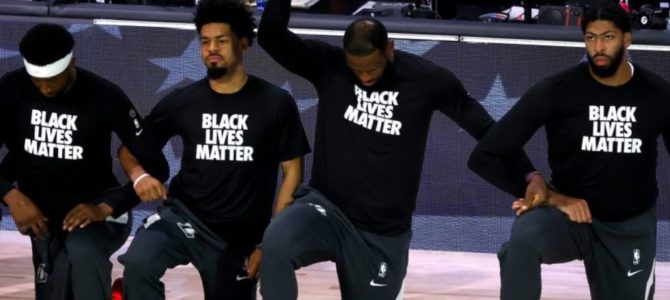
Someone needed to stand up to the sports establishment and tell them that the decision of leagues and many of their top athletes to go all-in on politicized messaging largely favoring the Black Lives Matter movement was turning off a lot of fans.
Television ratings and the overall popularity of pro sports are clearly on the decline. And with no active players or owners willing to risk being canceled for pushing back against the demands of the woke activists who dominate popular culture, it was going to have to be a retired athlete with the stature to resist the inevitable backlash against any dissent from the BLM catechism.
So maybe it was inevitable that it would be Brett Favre. He had already survived bad publicity for alcohol and drug problems, allegedly sexting to a female journalist, and the fact that he is a public supporter of former President Donald Trump. As a member of the Pro Football Hall of Fame, Favre remains an A-list sports celebrity.
Favre Vs. the Mob
But perhaps even Favre was surprised by the intensity of the blowback to the comments he made to The Daily Wire’s Andrew Klavan. Speaking in the aftermath of Major League Baseball’s hypocritical decision to move its annual All-Star Game from Atlanta to Denver because of Georgia’s passage of a new voting integrity law, Favre said the following:
I know when I turn on a game, I want to watch a game. I want to watch players play and teams win, lose, come from behind. I want to watch all the important parts of the game, not what’s going on outside of the game, and I think the general fan feels the same way. I can’t tell you how many people have said to me, ‘I don’t watch anymore; it’s not about the game anymore.’ And I tend to agree.
Predictably, a Twitter mob responded by bringing up his past problems. But much of the sports commentariat also denounced Favre. That columnists and TV hosts also turned on him demonstrated that mainstream sports journalism is as dominated by leftists as is those who cover politics. Yahoo sports columnist Shalise Manza Young was just one of many who denounced Favre by saying his “bleating about politics in sports is rank with privilege, ignorance, and hypocrisy.”
The personal attacks on Favre were redoubled by his comments in which he seemed to criticize the jury’s verdict in the Derek Chauvin case. But the main point consistently made in media hit pieces, from NBC Sports to The New Republic, was that Favre had no problem with politics in sports, just with politics that disagreed with his own conservative viewpoint.
According to Favre’s critics, the recent sea change in sports that began in 2016 when then San Francisco 49ers quarterback Colin Kaepernick knelt during the playing of the national anthem is nothing new. Kaepernick’s gesture in honor of the Black Lives Matter doctrine about America being a racist nation was at first widely criticized. But by last summer, when the death of George Floyd set off hundreds of “mostly peaceful” riots across the nation, the entire sports world was not only kneeling during the anthem but adopting the BLM mantra wholesale.
The National Basketball Association put the BLM slogan on their courts and on the backs of the players’ jerseys. Entire National Football League teams were kneeling or simply staying off the field during the anthem.
The left claims this is just an attempt to redress an imbalance. According to them, playing the anthem and all patriotic customs during games are political acts. That’s a surprise to Americans who thought the flag and the anthem were symbols of national unity. But, taking a page out of Marxist dialectic, leftists denounce Favre by asserting that the absence of politics — or rather, leftist demagoguery about America being an irredeemably racist nation — was itself political.
It would be wrong to assert that politics has never played a role in sports. Boxer Muhammad Ali losing his heavyweight title because he resisted the draft was intensely political, as were the anthem protests by African-American athletes at the 1968 Mexico City Olympics, which were then considered an act of disrespect to the flag but now lionized by popular culture as heroic. Because of the mix of nationalism and sports, the Olympics have often been a venue for political gestures of one sort or another.
Still, Favre is right when he notes the willingness of professional sports leagues like the NFL and NBA to embrace the BLM movement is unprecedented.
Republicans Buy Sneakers Too
In the past, most athletes were careful about avoiding politics because it was bad for business. Although he now says he was merely joking, NBA great Michael Jordan’s famous riposte to those wanting to know why he didn’t get involved in liberal politics — “Republicans buy sneakers too” — is still valid.
Nowadays, however, not denouncing the police or identifying with BLM goals is what makes a player stand out. Although he was widely denounced for an inflammatory tweet that seemed to threaten the officer who shot Columbus, Ohio teenager Ma’Khia Bryant to stop her from killing another person, NBA star Lebron James is unrepentant.
More importantly, the economic factor seems to have flipped. Whereas partisanship was once seen as offending the audience, now leagues assume they have more to lose by not promoting BLM propaganda because of the danger of being canceled by pop culture influencers.
Although the NBA and Major League Baseball have bought into the false claim about “systemic racism,” both leagues are compromised by business deals with a Chinese Communist regime that is committing genocide against Uyghurs as well as suppressing the human rights of all of its citizens. The fact that Daryl Morey was ostracized by the league and then eventually forced out as general manager of the NBA’s Houston Rockets because of a tweet criticizing China‘s actions against democracy in Hong Kong — a cause that James chose not to support — speaks volumes about the league’s lack of credibility on the question of human rights or racism.
But the facts bear out the truth of Favre’s criticism.
Ratings Don’t Lie
A recent YouGov/Yahoo News poll showed that going woke is costing sports leagues a lot of fans. According to the survey, 34.5 percent said they were watching fewer sports because of leagues adopting leftist ideology. That’s three times as many as those who said it increased their likelihood of watching.
The same evidence was on display in the ratings for the NBA finals, which fell by 50 percent when compared to the previous season when BLM slogans did not dominate the screen.
Viewership of sports on TV is down across the board. But the attempt to claim that politics has nothing to do with it is contradicted by polls. One from Marist showed the increased political content has alienated almost a third of the potential audience and caused fans to look elsewhere for entertainment.
Republicans who are hardcore supporters of teams may ignore Trump’s advice to boycott them even if they are disturbed by the politicization of the games. But the loyalties of more casual fans are very much in question.
The willingness of sports leagues to bend their collective knees to BLM ideologues may seem expedient when standing against the leftist tide seems foolhardy. But Americans who don’t already subscribe to toxic doctrines about their “white privilege” don’t want these ideas shoved in their faces when seeking an escape from ubiquitous political hectoring.
These people make up a big segment of the core audience of major league sports franchises. Favre may be easily ridiculed, but the sports industry ignores the interests of so many Americans at their own peril.









